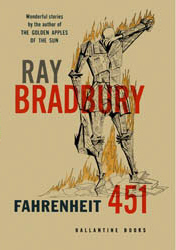Fahrenheit 451 is a dystopian novel by American writer Ray Bradbury, first published in 1953. It is regarded as one of his best works. The novel presents a future American society where books are outlawed and “firemen” burn any that are found.
Discussions about Fahrenheit 451 often center on its story foremost as a warning against state-based censorship. Indeed, when Bradbury wrote the
novel during the McCarthy era, he was concerned about censorship in the United States. During a radio interview in 1956,[71][72] Bradbury said:
I wrote this book at a time when I was worried about the way things were going in this country four years ago. Too many people were afraid of their shadows; there
was a threat of book burning. Many of the books were being taken off the shelves at that time. And of course, things have changed a lot in four years. Things are going back in a very healthy direction. But at the time I wanted to do some sort of story where I could comment on what would happen to a country if we let ourselves go too far in this direction, where then all thinking stops, and the dragon swallows his tail, and we sort of vanish into a limbo and we destroy ourselves by this sort of action.As time went by, Bradbury tended to dismiss censorship as a chief motivating factor for writing the story. Instead he usually claimed that the real messages of Fahrenheit 451 were about the dangers of an illiterate society infatuated with mass media and the threat of minority and special interest groups to books. In the late 1950s, Bradbury recounted:
In writing the short novel Fahrenheit 451, I thought I was describing a world that might evolve in four or five decades. But only a few weeks ago, in Beverly Hills one night, a husband and wife passed me, walking their dog. I stood staring after them, absolutely stunned. The woman held in one hand a small cigarette-package-sized radio, its antenna quivering. From this sprang tiny copper wires which ended in a dainty cone plugged into her right ear. There she was, oblivious to man and dog, listening to far winds and whispers and soap-opera cries, sleep-walking, helped up and down curbs by a husband who might just as well not have been there. This was not fiction.[73]
This story echoes Mildred’s “Seashell ear-thimbles” (i.e., a brand of in-ear headphones) that act as an emotional barrier between her and Montag. In a 2007 interview, Bradbury maintained that people misinterpret his book and that Fahrenheit 451 is really a statement on how mass media like television marginalizes the reading of literature.[6] Regarding minorities, he wrote in his 1979 Coda:
There is more than one way to burn a book. And the world is full of people running about with lit matches. Every minority, be it Baptist/Unitarian, Irish/Italian/Octogenarian/Zen Buddhist, Zionist/Seventh-day Adventist, Women’s Lib/Republican, Mattachine/Four Square Gospel feels it has the will, the right, the duty to douse the kerosene, light the fuse. […] Fire-Captain Beatty, in my novel Fahrenheit 451, described how the books were burned first by minorities, each ripping a page or a paragraph from this book, then that, until the day came when the books were empty and the minds shut and the libraries closed forever. […] Only six weeks ago, I discovered that, over the years, some cubby-hole editors at Ballantine Books, fearful of contaminating the young, had, bit by bit, censored some seventy-five separate sections from the novel. Students, reading the novel, which, after all, deals with censorship and book-burning in the future, wrote to tell me of this exquisite irony. Judy-Lynn del Rey, one of the new Ballantine editors, is having the entire book reset and republished this summer with all the damns and hells back in place.[74]
Book-burning censorship, Bradbury would argue, was a side-effect of these two primary factors; this is consistent with Captain Beatty’s speech to Montag about the history of the firemen. According to Bradbury, it is the people, not the state, who are the culprit in Fahrenheit 451.[6] Nevertheless, the role on censorship, state-based or otherwise, is still perhaps the most frequent theme explored in the work.[75][better source needed][76]
A variety of other themes in the novel besides censorship have been suggested. Two major themes are resistance to conformity and control of individuals via technology and mass media. Bradbury explores how the government is able to use mass media to influence society and suppress individualism through book burning. The characters Beatty and Faber point out the American population is to blame. Due to their constant desire for a simplistic, positive image, books must be suppressed. Beatty blames the minority groups, who would take offense to published works that displayed them in an unfavorable light. Faber went further to state that the American population simply stopped reading on their own. He notes that the book burnings themselves became a form of entertainment to the general public.[77]
Predictions for the futureEditBradbury described himself as “a preventor of futures, not a predictor of them.”[78] He did not believe that book burning was an inevitable part of our future; he wanted to warn against its development.[78] In a later interview, when asked if he believes that teaching Fahrenheit 451 in schools will prevent his totalitarian[2] vision of the future, Bradbury replied in the negative. Rather, he states that education must be at the kindergarten and first-grade level. If students are unable to read then, they will be unable to read Fahrenheit 451.[79]
In terms of technology, Sam Weller notes that Bradbury “predicted everything from flat-panel televisions to earbud headphones and twenty-four-hour banking machines.”[80]
